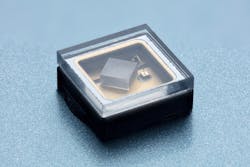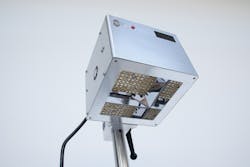ICULTA virtual conference to present research advances in UV LEDs
UV LEDs can be used to inactivate viruses and bacteria, disinfect water and surfaces, and to change the properties of materials. Also, plants can be irradiated and enriched with health-promoting secondary plant substances. To take even better advantage of these potentials in the future, UV LEDs with high optical power and long lifetime are needed.
Recognizing this, the Ferdinand Braun Institut (FBH; Berlin, Germany) will present current developments and results at the International Conference on UV LED Technologies & Applications (ICULTA 2021), set to take place online April 19–20, 2021. FBH will participate with an invited talk and showcase at the accompanying exhibition, where it will present its portfolio virtually. The range will extend from customized LEDs to ready-to-use prototypes that can be used for applications like surface disinfection. In particular, FBH will report on important progress in the reliability of UVB and UVC LEDs.
Until now, the lifetime of state-of-the-art UVB and UVC LEDs had been limited to several thousand hours. At the ICULTA conference, FBH will present new findings on degradation processes of UV LEDs. The degradation behavior was analyzed under different operating conditions, for different LED designs and material compositions. Based on their gained knowledge, FBH has derived a model for the physical degradation processes of UV LEDs. In collaboration with the Technical University of Berlin (TU Berlin), the research team has succeeded in increasing the lifetime of UVB LEDs and certain UVC LEDs to more than 10,000 hours, which is important progress to ensure that the devices can be used in future commercial products. Together with its partner, FBH will offer customized UV LEDs with specific wavelengths in the UVB and UVC spectral range. The portfolio also comprises customized packages that, for example, have monolithically integrated electrostatic discharge (ESD) protection or are equipped with micro-optics to adjust the emission angle.Another prototype with 265 nm LEDs was specifically developed to disinfect everyday objects such as mobile phones and reusable masks. The demonstrator comprises 128 LEDs that irradiate the respective object, which lies on a UV-transparent glass pane, from both sides. The average irradiance is more than 1 mW/cm2.
For more information, please visit iculta.com/program.
Source: Ferdinand Braun Institut press release – March 29, 2021


